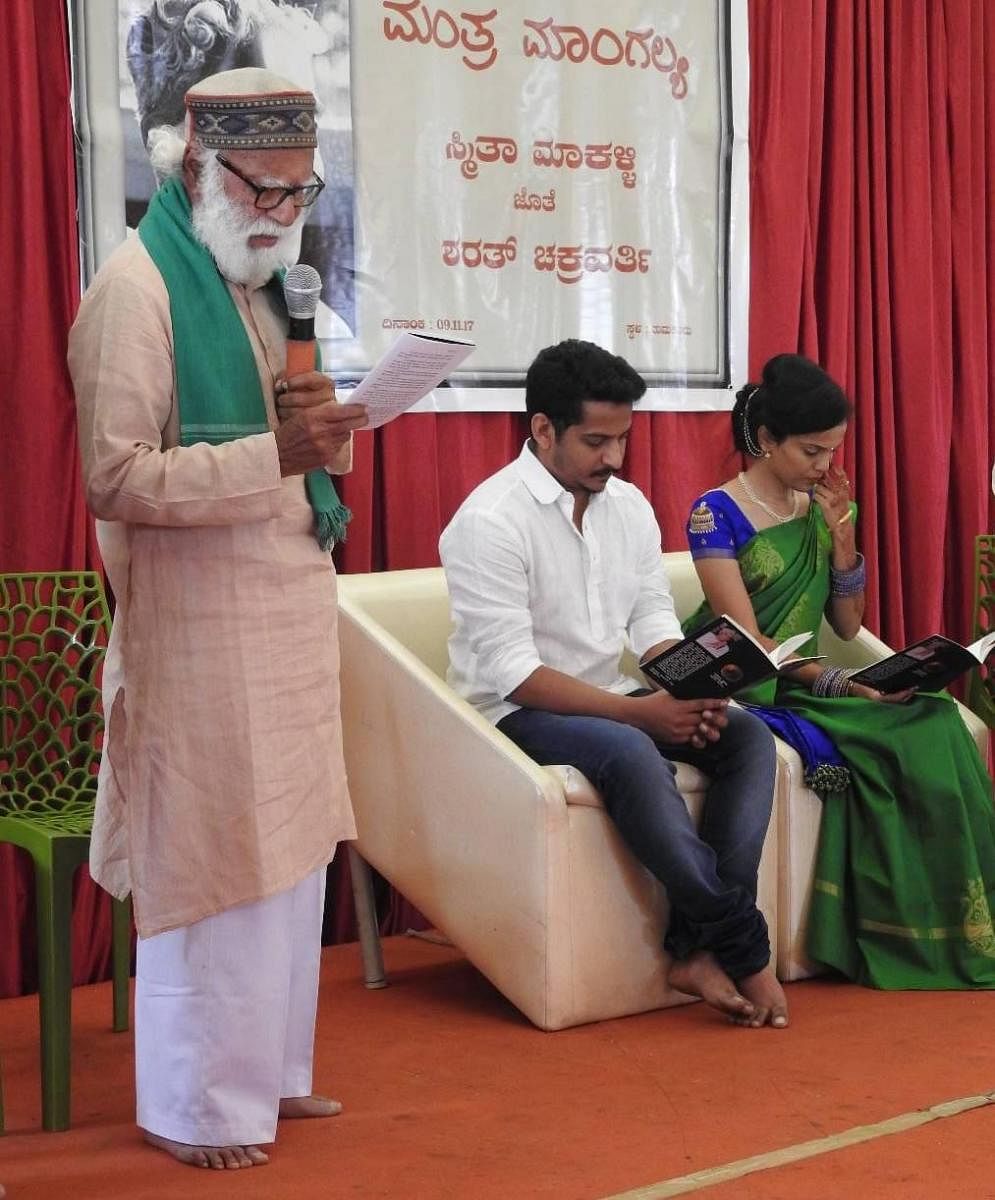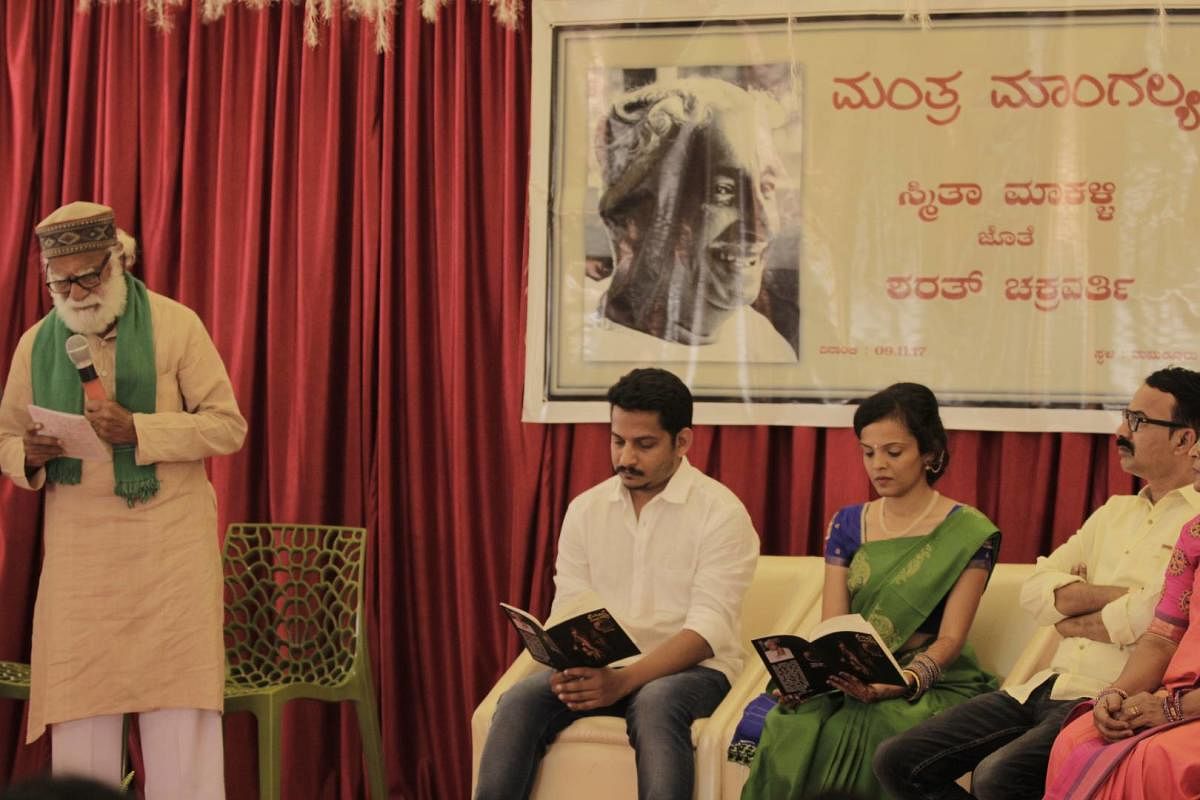
With the restriction on social gatherings due to the Covid-19 pandemic, the concept of having a simple marriage has become popular. For some it could be a compulsion, but a majority of the young couples take pride in rejecting the big fat Indian wedding. Once limited to those who read or were influenced by the ideologies of poet laureate Kuvempu or celebrated writer Poornachandra Tejaswi, now the idea has reached a broader cross section of society.
Modern-day simple wedding in Karnataka was advocated by Kuvempu. He advised the youth to free themselves from the shackles of traditions and rituals by going for the ‘marriage of minds’; he asked those seeking a better society to begin the work at home, by adopting a small change and opting for a simple wedding (sarala maduve), sans the dowry, fanfare and rituals of a traditional Indian ceremony.
To promote the concept of simple weddings, Kuvempu had composed secular vows or the commandments for the marriage ceremony and called them the ‘Mantra Mangalya’, which soon transformed into a tool for social change and the sacred text for a simple marriage. Of course, Kuvempu’s advocacy for social change began in his own house - the first couple to translate his thoughts into action were his son, the late K P Poornachandra Tejaswi and his daughter-in-law Rajeshwari Tejaswi.
Personal wedding invites, hand-written on inland letters by Kuvempu himself, were delivered to the guests. The letter simply stated: “Please visit us whenever convenient, enjoy our hospitality, bless the couple and pray for their progress.”
Sharing memories of her wedding day, Rajeshwari Tejaswi says, “We belonged to different faiths and in 1966, decided to get married. Only 36 guests attended the ceremony, while Kuvempu sermonised the Mantra Mangalya. The only relative to attend our marriage, apart from our family members, was Rajamma, my father-in-law’s sister, and her family. There were reports that our marriage was discussed in the Vidhana Soudha then.”
In her book, “Nanna Tejaswi” dedicated to her late husband, Rajeshwari says, “There was no question of me opposing the idea of a simple wedding. I completely trusted Tejaswi and supported him in all his endeavours.”
Tejaswi’s friends - Sundaraesh, Kadidal Shamanna, Professor B N Sriram, R Raghavendra and many others, including his children, followed his lead in opting for simple weddings.
According to farmer leader Kadidal Shamanna, “There was a time when Mantra Mangalya was not socially accepted.” Adds Shree Devi, his wife, “The concept of simple marriage has also evolved over a period of time. It is being tweaked and modified to suit the situation.”
Old Mysuru region
Motivated youth in the Malnad region embraced Mantra Mangalya in large numbers in the 70s and 80s.
The concept stirred society’s conscience in a way no book or speech ever could.
In the 80s, the old Mysuru region was grappling with a severe drought and for distressed farmers, the expenses associated with marriages and other rites were pushing them deeper into debt. The farmers in these regions popularised Mantra Mangalya as part of their movement.
Even if the farmers did not follow the Mantra Mangalya down to the letter, they distilled its essence and used it to reject the dowry system; backed by farmer leaders like Professor Nanjundaswamy and K S Puttannaiah, many families opted for a simple marriage, ushering in a cultural revolution.
The bride and groom would often sport green shawls, symbolising the farmers’ movement and would solemnise their marriage in the presence of elders, in the midst of nature.
Haravu Devegowda, who had a simple marriage during the time, says, “I exchanged garlands with my wife and distributed only laddus among our guests. My marriage expenses were rounded off to Rs 600. The austerity was misconstrued as being tight-fisted.”
Nanjundaiah from Seethapura village, Mandya district, says, “I bought a bullock cart to eke out a living from the money I saved from my simple wedding. Many people avail loans, sell houses, mortgage land, gold, to be splurged on a single day to please their kith and kin.”
Modern day
Just before the pandemic struck, Swathi K H and Goravi Aldur got married at Janapada Loka in Ramanagara, in the company of a few friends. They exchanged garlands, as novelist Kum Veerabhadrappa recited the Mantra Mangalya. The guests present were treated to a spread of rice-sambar, a sweet and were gifted books. Impressed by the couple’s decision, Nirmalanandanatha Swami, the head of Adichunchanagiri Math, expressed his desire to promote Mantra Mangalya among the Ashram inmates.
Smitha Makalli and Sharath Chakravarthi too were largely influenced by Kuvempu and Tejaswi’s works and chose Mantra Mangalya for their special day. “We strongly felt our marriage should be a private affair. What made me like Mantra Mangalya is its democratic views and clear rejection of superstitious beliefs,” says Smitha.
Another couple, Suhasini Koulagi and Raghu, stressed on the fundamental messages of independence and simple living at their wedding in December 2019, in Melkote. Clad in khadi attire, they didn’t wear any gold jewellery. “We wanted to set an example by opting for a simple marriage. So we felt Mantra Mangalya would be perfect for us,” says Suhasini.
Constitutional oath
Court marriages and Arya Samaj wedding ceremonies are also popular among couples.
When actor-activist Chetan Ahimsa and social worker Megha decided to walk down the aisle, they got their marriage registered at the Sub-Registrar’s Office in Bengaluru under the Special Marriage Act. Dressed in a simple attire, the bride and the groom, exchanged the sacred vows with the Indian Constitution in their hands, with close friends and family present.
Not comfortable with the idea of tying mangalsutra to his bride, which shatters the very concept of gender equality, Chetan said: “It’s time we chose simplicity over display of wealth and vanity.”
Many couples are incorporating book releases, blood donations, and spreading ‘No Gifts Please’ and ‘Use No Plastic’ messages in their marriages. Books, seed balls and saplings are offered as return gifts to guests.
The simple weddings taking place due to the pandemic are another instance in a young tradition of simple, socially progressive wedding ceremonies that Kuvempu began decades ago.
